Chrome 27, Firefox 22, IE10, And Opera Next, Benchmarked
Today, we have the latest benchmark results from the top four Windows-based Web browsers, along with a sneak peek at Opera's upcoming Chromium-based overhaul. Is this really a step-up from Presto/Carakan or just another Chrome clone?
Hardware Acceleration Performance
Hardware acceleration is split into two main sections: native HTML5 HWA, and WebGL.
Native HTML5 Hardware Acceleration
While CanvasMark 2013 is a new addition to the WBGP, in actuality, it's an update to an old staple. This test is written by UK Web developer Kevin Roast, who also wrote the Asteroids HTML5 Canvas 2D & JavaScript Benchmark. In fact, CanvasMark includes many portions of the updated version of his Asteroids game.
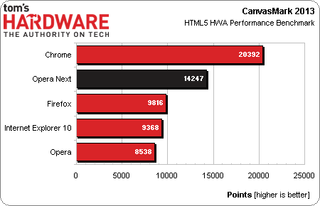
Chrome takes a decisive lead in this test, scoring just over 20,000 points. Opera Next is the runner-up at just under 15,000 points. Firefox is another 5000 points behind in third, with IE10 and Opera 12 close behind in fourth and fifth place (respectively). Once again, the Chromium-based Opera Next shows a hefty advantage over the current Presto/Carakan-based Opera 12.
For this installment, we're ditching Psychedelic Browsing since we just received CanvasMark. We're retaining WebVizBench, but replacing the synthetic scores with FPS results.
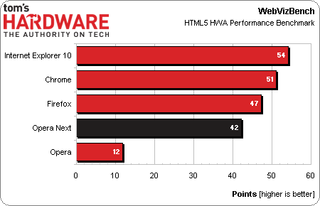
IE10 still has the upper hand in this test. Chrome takes a second-place finish at 51 FPS, with Firefox in third. Opera Next places fourth, while Opera 12 only manages to earn an appropriate 12 FPS. Yet again, Next represents a significant step up, this time more than tripling the performance of Opera's current version.
WebGL
As of now, only Chrome and Firefox sport stable, default WebGL implementations. IE10 does not support WebGL at all. Microsoft had cited security concerns, though recent reports show that IE11 will get WebGL support. As a Chromium derivative, Opera Next also has WebGL support. While Opera 12 is capable of running WebGL content (by enabling WebGL; default is disabled), it doesn't properly support either of our current WebGL tests.
The Scirra WebGL performance test measures the number of 2D triangles represented onscreen when the animation reaches the 30 FPS threshold.
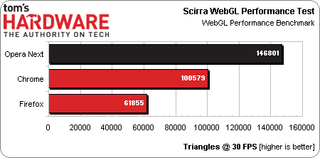
Opera Next comes out of nowhere with a serious victory over both Chrome and Firefox, able to display nearly 50% more triangles than Chrome 27, and more than twice as many as Firefox 22.
Instead of triangles, LUIC, our new WebGL benchmark, continuously adds 3D cubes until the animation reaches 50 FPS.
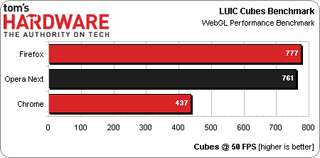
Firefox 22 takes the lead here, with Opera Next in a very close second place. Meanwhile, Chrome 27 achieves just around half the score of the top two, placing dead last.
Hardware Acceleration
Moving on to general hardware acceleration testing, we have JSGameBench, which contains both native HTML5 and WebGL components.
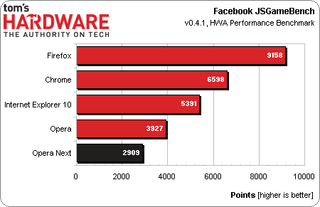
Firefox 22 is victorious yet again, with a score nearly 30% higher than that of Chrome 27. IE10 takes up the middle ground, with Opera 12 earning the fourth-place position. Oddly, Opera Next places dead last.
We're not sure what's happening here. Both HTML5 HWA benchmarks place Opera Next above the Norwegian browser's current version, and the upcoming Chromium-based browser's stellar WebGL scores in both Scirra and LUIC tests seem to have no such sway in JSGameBench. In any event, with four contradictory metrics, we're sure that our HWA composite score will largely absorb this odd result.
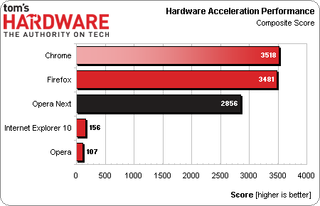
And it does. Chrome 27 shows a small lead over Firefox 22, with Opera Next just 600 point behind Mozilla in third place. Due to sitting out the WebGL testing, IE10 and Opera 12 barely rate. Although both browsers also show sub-par HTML5 HWA scores, Microsoft's high score in the IE-friendly WebVizBench allows Redmond's Web browser to surpass Opera 12.
Current page: Hardware Acceleration Performance
Prev Page HTML5 And CSS3 Performance Next Page Memory EfficiencyStay on the Cutting Edge
Join the experts who read Tom's Hardware for the inside track on enthusiast PC tech news — and have for over 25 years. We'll send breaking news and in-depth reviews of CPUs, GPUs, AI, maker hardware and more straight to your inbox.
-
Onus No, the Onus is not on Google; I'm using www.startpage.com for my searches.Reply
While this is interesting, I still encounter built-in pages (such as on routers or other network devices) that will not render cleanly in Firefox, but are perfect in IE. More often than not though, pages that would be filled with nuisance ads and popups are cleaned up nicely by Firefox with AdBlock+ and NoScript.
-
soundping A good test is rendering a heavy site like Huffington Post. They use a ton of flash and java scripts.Reply -
ivyanev While benchmarks are the way to compare browsers, they do not represent the feel you get- firefox might be faster but still feels sluggish compared to chrome or opera(the stable one).Reply -
pharoahhalfdead I would like to see benchmarks on page start up, and load times comparing ssd, hard drives, and ram drives. Maybe I missed these an a previous article, but I feel since ssd's and ram drives are getting more popular, benchmarks should prove or dispel the the 'so called' benefits they bring.Reply
I have both and start up times for IE are quick but page load times are horrendously slow, whereas FF has slow start up times but superfast page load times. It's possible that add-ons are contributing to that. -
mikeynavy1976 Ever since I have compared Firefox and Chrome I've always found Chrome to start much faster (I'm running the Dev channel and my wife uses the Stable channel and they both take maybe 1 - 2 seconds to start cold or hot). Only IE beats both of them. Maybe Firefox 22 is that much faster and worth a try, but seeing as Chrome did so well in most categories I'll probably stick with it.Reply -
EzioAs Having move back to Firefox a couple years ago after Chrome, I don't intend to use Chrome (or any other browser) regularly anymore. I still give Chrome 2-3 tries a week (just to compare things) but Chrome isn't better than FF in 3 things:Reply
1) Pages load noticeably slower
2) Memory usage is indeed high (as seen in the benchmark above)
3) FF add-ons are much better than chrome extensions.
I never noticed any startup time difference for both FF and Chrome; it's possible they're both fast enough that it doesn't even matter at this point. I also like the FF toolbars better although that's really more of a personal preference. I've never tried maxthon though; heard it's pretty good. -
beoza I've never really noticed a difference in browsers speed wise. Sure some load pages faster than others, and some have issues with certain pages. But in the end they all take me to the same place. I use Firefox 95% of the time at home with adblock+, if I encounter an issue I clear cache, if it still has issues I switch to IE 10, usually this is all I need to do but once in a while IE has problems with a page and I just move on to something else. At work I'm stuck using IE10. The speed of a browser can also be affected by other factors like the speed of your connection, how many devices are on your network, what tasks your doing on the computer at the same time like gaming, downloading, streaming movies (netflix, hulu), and your hardware. You're not going to get much responsiveness on a 5yr old celeron w/2gb ram and Win XP while you're downloading a game, watching youtube and the A/V suite scans your computer in the background, and there's 5 other people all sharing your 10Mbps network. Which describes probably 50% of the users out there in the real world.Reply -
Someone Somewhere Opera Next (and every other browser) is a significant step down in terms of features/customization from the current version.Reply
I'll miss a hell of a lot of stuff when I move off Presto-based Opera. -
ElDani Well done on this test, I actually found the test results genuinely helpful and your summary/conclusion to be well thought out.Reply
Still, this test shows us once more, that no modern browser - I exclude Opera from this, since it isn't a maintained release anymore - must absolutely be replaced by the winner of such tests. If you don't mind performance weaknesses of the Internet Explorer in certain areas, or if your most-accessed websites don't require you to use a certain alternative, then even Microsoft's browser of choice can be okay for daily use (if only as an engine in products like Avant, Maxthon, etc).
The one thing I'm a bit curious about: why does Opera Next suddenly behave so differently from Chrome? Yes, there's a difference between Chrome 27 (WebKit) and Opera Next (Blink = Chrome 28), but if that's the only reason for the browser's weaker showing, then the future of Chrome doesn't look too good. What's your take on this? -
tomfreak I dont know how useful in this review when they are tested all the browser on a 1155 super computer, nobody is going to tell the diff if the browser is 0.25sec faster. Get some Brazos, Atom and run the test, these are the platform have problems with web browsing.Reply
